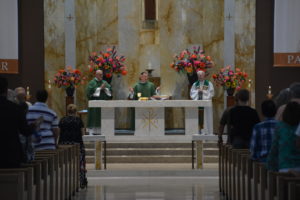To the prelates of North Africa: always be men of hope
By VISarchive 02
Vatican City, 2 March 2015 (VIS) – This morning, the prelates of the Regional Episcopal Conference of North Africa (C.E.R.N.A), which encompasses the dioceses of Morocco, Algeria, Tunisia and Libya were received in audience by the Pope at the end of their “ad Limina” visit. The Holy Father handed them a written address in which he recalls that the history of the region has been marked by many saintly figures from St. Cyprian and St. Augustine, a “spiritual patrimony for all the Church”, to Blessed Charles de Foucauld, who died one hundred years ago next year.
“For several years your region has been experiencing significant changes, which offer hope that aspirations to greater freedom and dignity may be fulfilled and which favour greater freedom of conscience”, continues Francis. “But at times these events have led to outbursts of violence. I wish to mention, in particular, the courage, loyalty and perseverance of the bishops of Libya, as well as the priests, consecrated persons and laypeople who stay in this country despite the many dangers. They are genuine witnesses of the Gospel. I thank them with all my heart and encourage them to continue their efforts in contributing to peace and reconciliation throughout the region”.
“Your episcopal conference … is an important forum for exchange and dialogue, but it must also be a tool for communion, for deepening fraternal relations and mutual trust”, the Pope writes. “The pilgrimage to Rome is a good opportunity to renew your joint commitment in the service of the Church’s mission in each of your countries. You carry out this mission with your priests, your direct collaborators. They are from many countries and at times it is difficult for them to adapt to new situations. Therefore, it is particularly important to be close to them and to be attentive to their continuing formation so that they can live their ministry fully and serenely. … Men and women religious also have a special place in the life and in the mission of your Church, and I thank them for their witness of fraternal life and their generous commitment to the service of their brothers and sisters”.
“At the heart of your mission and at the origin of your hope there is, above all, the personal encounter with Jesus Christ and the certainty that He is at work in the world where you have been sent on His behalf. The evangelical vitality of your dioceses depends, therefore, on the quality of your spiritual and sacramental life”, observes the Holy Father, who alongside the saints from the region, mentions also “the men and women religious who have offered everything to God and to their brothers, to the point of sacrificing their own lives”. He highlights the bishops’ responsibility for developing this spiritual legacy firstly among the faithful, but also opening it up to all. “I am pleased to hear that in recent years, various Christian shrines have been restored in Algeria. By welcoming all, kindly and without proselytising, your communities show that they wish to be a Church with open doors, always reaching out”.
“Universality is a feature of these Churches, where the faithful come from many countries to form living communities. … This offers the opportunity to admire God’s work, which spreads among all peoples and all cultures”, writes the Pontiff, who goes on to greet the many students from sub-Saharan Africa, whom he invites to “stay firm in the faith” so as to be able to establish “bonds of friendship, trust and respect” with all persons, “thus contributing to the construction of a more fraternal world”.
Interreligious dialogue is also very important in the life of these Churches, and Francis stresses that in this field “the imagination of charity can open up countless ways of bringing the breath of the Gospel to the most diverse cultures and social sectors. As you are aware, mutual ignorance is the source of many misunderstandings and even conflicts. … The most effective antidote to any form of violence is education in the discovery and acceptance of difference as richness and fertility. Therefore, it is essential that priests, religious and laypeople in your dioceses are well-prepared in this area”.
In this regard, the Pope notes his satisfaction that the Pontifical Institute for Arabic and Islamic Studies (PISAI), born in Tunisia, will celebrate its fiftieth anniversary this year. He invites the bishops to “support and make use of this institution when necessary, to experience language and culture” and to “deepen dialogue in truth and love between Christians and Muslims”. This dialogue is also experienced by bishops on a day-to-day basis with Christians of other confessions, and Francis therefore expresses his desire that the Al Mowafaqa Ecumenical Institute, founded in Morocco to promote ecumenical and interreligious dialogue may also contribute to greater mutual awareness.
“A Church of encounter and dialogue, you also wish to be at the service of all without distinction. Often with modest means, you manifest the charity of Christ and all the Church towards the poor, the sick, the elderly, women in need and the imprisoned. Thank you for your work in the assistance of the many immigrants from Africa who seek in your countries a place of transit or of welcome. Recognising their human dignity and working to awaken consciences before so many human tragedies, you show God’s love for each one of them”.
“Dear brothers in the episcopate”, he concluded, “I wish to assure you of the support of all the Church in your mission. You are in the ‘peripheries’, with your special service of making manifest the presence of Christ and His Church in this region. Your testimony of life in simplicity and poverty is an eminent sign for all the Church. Be assured that the Successor of Peter accompanies you on your rough road, and encourages you always to be men of hope”.
Source:: Vatican Information Service



